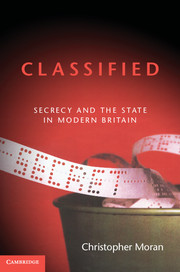Book contents
- Frontmatter
- Contents
- Illustrations
- Foreword
- Acknowledgements
- Abbreviations
- Introduction
- Part I 1889–1945
- Part II Secrecy and the press
- Part III Secrecy and political memoirs
- Part IV Intelligence secrets, spy memoirs and official histories
- 7 Keeping the secrets of wartime deception: Ultra and Double-Cross
- 8 SOE in France
- 9 Counterblast: official history of British intelligence in the Second World War
- Epilogue: from Wright to WikiLeaks
- Notes
- Bibliography
- Index
- Plate section
9 - Counterblast: official history of British intelligence in the Second World War
Published online by Cambridge University Press: 05 April 2013
- Frontmatter
- Contents
- Illustrations
- Foreword
- Acknowledgements
- Abbreviations
- Introduction
- Part I 1889–1945
- Part II Secrecy and the press
- Part III Secrecy and political memoirs
- Part IV Intelligence secrets, spy memoirs and official histories
- 7 Keeping the secrets of wartime deception: Ultra and Double-Cross
- 8 SOE in France
- 9 Counterblast: official history of British intelligence in the Second World War
- Epilogue: from Wright to WikiLeaks
- Notes
- Bibliography
- Index
- Plate section
Summary
There is a big difference between secrets reaching the public through journalistic or other revelations and their being presented with the authority of Her Majesty's Government.
T. M. P. Stevens, Defence Secretariat,18 August 1972As we have seen, the late 1960s were a traumatic time for Britain's secret keepers. In 1967, a year after attempting to establish a measure of control over journalists and private authors with SOE in France, officials tried but failed to stop a succession of damaging disclosures. Chapman Pincher led the way by carrying a story on clandestine government interception of international telegram traffic. The Sunday Times then brought revelations about Philby's thirty-year devotion to the Russian cause, before the Daily Express defied tradition by telling its readers the identities of the men who headed MI5 and SIS. In 1968, the exiled Philby delivered a devastating blow to his erstwhile secret bosses by publishing an intentionally misleading memoir, entitled My Silent War. Sponsored by the KGB and published by Grove Press in New York, the book was a brutal indictment of Western intelligence operations against the Soviet Union, revealing how British and American secret services had been dogged by petty rivalries, lack of discipline and bad planning. My Silent War, which described SIS procedures and personnel in rich detail, contained not a spark of regret. Its author, appallingly, was pitiless in writing of those he had sent to their deaths. Philby had offered to withdraw the book if the British government agreed to release Peter and Helen Kruger, two convicted Soviet spies serving twenty-year terms in Wormwood Scrubs prison; his proposal was turned down.
The state was deeply chagrined by the outpouring of sensitive material, and considerable time was spent thinking about the best future strategy for dealing with those who wanted to reveal ugly secrets. In one camp were people like George Wigg who argued that a line had to be drawn and that the government should not be afraid to use the Official Secrets Act to police that line. This crude and unsophisticated approach was famously put into effect in the 1970s when legal action was initiated firstly against The Sunday Telegraph and secondly against Duncan Campbell and his coadjutors. In another camp, there was a cluster of officials who believed that no matter how hard the state tried to stop the leaks, it could not stop them all.
- Type
- Chapter
- Information
- ClassifiedSecrecy and the State in Modern Britain, pp. 311 - 328Publisher: Cambridge University PressPrint publication year: 2012

